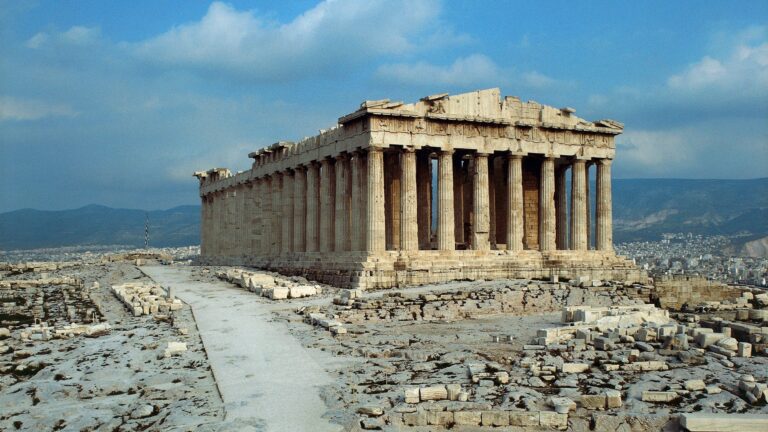The term Ancient or Archaic Greece refers to the years 700-480 BC. This period is known for its art, architecture and philosophy. Ancient Greece saw advancements in art, poetry, and technology and is known as the era in which the polis, or city-state, was invented. The polis became the defining element of Greek political life for hundreds of years.
The birth of the city-state
During the so-called “Greek Dark Ages”, before the Archaic period, people lived scattered throughout Greece in small agricultural villages. As these villages grew in size, they began to evolve. Some built walls, most built a market (an agora) and a community meeting place.
They developed governments and organized their citizens according to some sort of constitution or set of laws. They raised armies and collected taxes. And each of these city-states (known as poleis) was believed to be protected by a particular god or goddess, to whom the citizens of the polis owed much reverence, respect, and sacrifice. (The deity of Athens was Athena, for example; that of Sparta too.)
Even if their citizens had in common what Herodotus Called “the same stock and speech, our shared temples of gods and religious rituals, our customs similar,” each Greek city-state was different. The largest, Sparta, controlled approximately 300 square miles of territory; the smallest had only a few hundred people.
Did you know? Greek military leaders trained heavily armed hoplite soldiers to fight in massive formation called a phalanx: standing shoulder to shoulder, the men were protected by their neighbor’s shield. This intimidation technique played an important role in the Persian Wars and helped the Greeks build their empire.
However, by the dawn of the Archaic period, in the 7th century BC, city-states had developed a number of common characteristics. Their economies were all based on agriculture and not trade: for this reason, land was each city-state’s most valuable resource. In addition, most had overthrown their hereditary kings, or basileus, and were ruled by a small number of wealthy aristocrats.
These people monopolized political power. (For example, they refused to let ordinary people sit on councils or assemblies.) They also monopolized the best agricultural land, and some even claimed descent from greek gods. Because “the poor, with their wives and children, were slaves of the rich and had no political rights”. Aristotle He said: “There has been conflict between the nobles and the people for a long time. »
Colonization
Emigration was a way to alleviate some of this tension. Land was the most important source of wealth in city-states; it was also, obviously, in limited quantity. The pressure of population growth caused many men to leave their original poleis and settle in sparsely populated areas around Greece and the Aegean Sea.
Between 750 and 600 BC, Greek colonies arose from the Mediterranean to Asia Minor, from North Africa to the coasts of the Black Sea. By the end of the 7th century BC there were over 1,500 colonial poleis.
Each of these poles was an independent city-state. In this sense, the colonies of the Archaic period were different from other colonies we know: the people who lived there were neither governed nor tied to the city-states from which they came. The new centers were autonomous and self-sufficient.
The rise of tyrants
As time passed and their populations increased, many of these agricultural city-states began producing consumer goods such as pottery, cloth, wine, and ironwork. The trade in these goods made some people – generally outsiders of the old aristocracy – very rich. These people were unhappy with the unchecked power of the oligarchs and banded together, sometimes with the help of heavily armed soldiers called hoplites, to put new leaders in charge.
These rulers were known as tyrants. Some tyrants have proven to be just as autocratic as the oligarchs they replaced, while others have proven to be enlightened leaders. (Pheidon of Argos established an orderly system of weights and measures, for example, while Theagenes of Megara brought running water to his city.) However, their reign did not last: the Classical period brought with it a series of political reforms which created the system of Ancient Greek democracy known as demokratia, or “rule by the people.”
Archaic Renaissance?
The colonial migrations of the Archaic period had an important effect on art and literature: they spread Greek styles everywhere and encouraged people around the world to participate in the creative revolutions of the era.
The epic poet Homer, originally from Ionia, produced his “Iliad” and “Odyssey” in the archaic era. Sculptors created kouroi and korai, carefully proportioned human figures that served as memorials to the dead. Scientists and mathematicians also progressed: Anaximandros devised a theory of gravity; Xenophanes wrote about his discovery of fossils and Pythagoras of Kroton discovered his famous Pythagorean theorem.
The economic, political, technological, and artistic developments of the Archaic period prepared the Greek city-states for the monumental changes of the following centuries.


